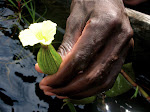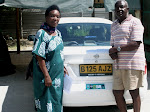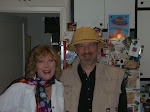


Monday
(with photos of Lally; the wet children on the patio; the older children studying their English and learning about compassion toward people and animals...)
Have you ever met people whose eyes shine with what can only be called goodness?
Gerald and Lally Warren fit the bill.
In my overnight visit to Lobatse, I couldn’t keep track of all they had going on in the service of other people. Three young boys showed up ostensibly for an enrichment reading class that Gerald and Lally host in their house on many days. But the young boys, who must have been about 6 or 7, understood that this particular class on this morning was for older children. Nonetheless, they had trudged over, dripping wet and hopeful. What they really wanted was a safe, dry spot and some food.
Lally soon had sandwiches for them – crusts cut off -- and drinks on the front patio. Gerald, a retired primary schoolteacher who had worked for the mining company’s school in Jwaneng, was a mobile headmaster of sorts, driving around in the Land Rover to pick up and drop off children on this rainy Saturday. He retired last year and he and Lally moved to Lobatse to live in Lally’s old house and launch an HIV/AIDS program with their own money: Letsema la Itlotlo, a project for “cultural & spiritual paths to behavioural change.” Plenty of AIDS programs have been operating throughout the country, and the Warrens say that even the most impoverished residents show remarkable knowledge about “the soldiers” in one’s bloodstream fighting off infections and how the AIDS virus can defeat the soldiers. From the time they are in primary school, the Batswana know what to do to prevent AIDS.
Primary kids know more about sex than I do, Gerald told me.
But the problem is that despite the vast investment in public education about AIDS, young people are not changing their behavior. About a quarter of the country’s population is infected. Grandmothers all over the country are raising their dead children’s children.
The Warrens believe existing programs have failed to change underlying societal attitudes, and that’s where they say their program will come in: using school workshops and drama to stress self-respect, abstinence before marriage and fidelity inside marriage as a positive lifestyle. They are drawing from the spiritual and moral teachings of the world’s religious traditions and relying on Setswana cultural values such as ‘botho,’ which means respect and good manners, to form the foundation of their program.
They themselves are Baha’i and have traveled to international conferences around the globe to support the teachings and members of their faith. Major tenets are unity of all people, gender equality, recognition of religious master teachers from many traditions such as Christianity and prayer. I know little about Baha’i but was very interested to hear the Warrens speak about their journey; I could tell in no time that their faith is in action round the clock.
Lally grew up in Mafikeng, an important trading center and what historians say was the headquarters of traders, lawyers, labor recruiters and newsmongers. The first independent Setswana newspaper was launched there. This was also beside the settlement of the Barolong people, Lally’s tribe. If I’ve got this right, Lally is the granddaughter of Silas Thelesho Molema, royalty among the Barolong people, an early nationalist politician and the one who ran the first black-owned Setswana newspaper. His son, Lally’s maternal uncle, Dr. M.S. Molema was a medical doctor who studied in Glasgow and pioneered black Southern Africa historiography, according to the “Historical Dictionary of Botswana.” White or black, anyone in those days in Mafikeng in the early 20th century wanted Dr. Molema to treat them, Gerald said.
As a child Lally equated white people only with unkindness, the most disturbing example occurring when her brother was arrested and jailed with his friend. The reason? The two boys had been sharing a chocolate bar, and a white man who saw them said no black boy could afford that candy. He called a police officer and had them arrested for stealing. Lally’s view that all white people were horrible persisted until a white Canadian couple moved to Mafikeng. The man and woman were Baha’i and believed that all people were equal and equally loved by God. They befriended Lally’s family. Eventually Lally’s parents and then Lally herself embraced the religion. In those days blacks and whites couldn’t fraternize, so if Lally’s parents were at the Canadian couple’s house to worship and white visitors arrived unexpectedly the black Africans in the house would rush from the sitting room and start washing dishes or cleaning so the friendship would remain hidden. The Canadians would drive to Lally’s house and flash their lights. Lally’s father would wave a lantern if the coast was clear, signaling it was safe for the Canadians to come inside.
Lally would never have believed when she was a child that one day she would fall in love with a white British man who dressed “flamboyantly, like a hippie” and came to Botswana to teach. They married nearly 26 years ago. They have three children. One daughter lives in Beijing, married to an ethno-musicologist with a specialty in Mongolian music who was recruited by McKinsey & Co.. Two children are at the University of Cape Town. Another child whom Lally’s mother had cared for became their foster child. She’s grown now and living in London, where she works as a chef.
I won’t ever forget meeting the Warrens or seeing their house filled with books about Africa and the Setswana language (Lally is co-writing with a professor a comprehensive Setswana-English dictionary), books of Baha’i prayers and photographs, and, in the living room, the historical charcoal drawings of Lally’s royal grandfather, her grandmother for whom she is named and her father. It was here at the Warrens’ I first tasted sorghum with honey for breakfast even as Gerald and Lally watched me eat alone. They were in their 19 days of fasting, eating only before sunrise and after sunset in keeping with the Baha’i tradition before the new year begins on March 21. It was here I watched the movie, “A Marriage of Inconvenience” about Botswana’s first president, the man intended to be king, Sir Seretse Khama, and his marriage in 1948 to a white London typist, Ruth Williams. The British government, the Anglican church and South African leaders tried to stop the interracial marriage and then tried to undermine it in the name of national security. It’s the Khamas’ first-born son who will become president in two weeks. I’m learning so much that some days my head feels as if it will explode. And I haven’t even mentioned how I’ve had two private lessons in Setswana and have more scheduled for this week. Nor have I mentioned that Lally is the second cousin of the wife of Botswana’s second president, Quett Masire. Lally, who trained as a nurse and midwife, accompanied the Masires on a peace mission to Rome to try to work out the crisis in Mozambique and then on a diplomatic visit to the U.S. in 1992, serving as a lady-in-waiting to Botswana’s first lady. It’s all overwhelming and thrillingly exhausting.
Robale sentle. Don’t hold me to the spelling. But sleep well, I say. I know I will.





2 comments:
good morning, Maria. Lunch today?
good morning, Maria. Lunch today?
Post a Comment